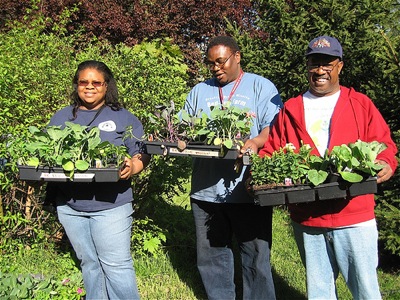
Give Mother Nature a vacant city lot, and she'll fill it with weeds and wildlife. Then human nature comes along and dumps clumps of consumer goods-gone-bad and construction debris on top of the pigweed and pigeons.
It takes visionaries like Reverend DeVanie Jackson and her husband, Reverend Robert Jackson, to convert a garbage-filled Brooklyn lot into a productive urban farm that provides 3,000 people a month with fresh, healthy food. The Reverends Jackson, who run an emergency food pantry in Bedford Stuyvesant, the Brooklyn Rescue Mission, became urban farmers out of sheer necessity back in 2004, challenging the 'charity' of serving poor people even poorer food.
I first wrote about Reverend Robert Jackson and the Bed-Stuy Farm after hearing him speak at a forum last year sponsored by World Hunger Year (WHY), a non-profit dedicated to fighting hunger and poverty. Jackson explained how his frustration over the salty, sugary, unhealthy processed foods typically passed out at food pantries compelled him to become a farmer:
Jackson, seeing the need all around him, asked, "Why wait for food? Why not grow our own food?" He collared everyone he could, from seniors to substance abusers, to help convert empty lots to thriving food gardens. Call it a soil revival, or a soul revival; either way, Reverend Jackson's giving folks the means to wean themselves off of junk food and other junk, too.
The Reverends Jackson started the Bed-Stuy Farm with the help of NYC's GreenThumb program on a junk-filled lot owned by a nonprofit developer. An old house on the site, slated to be converted into affordable housing, had such severe structural problems that it had to be torn down. The land was left to languish, becoming a dump and an eyesore.
Today, the Bed-Stuy Farm is a stellar example of urban agriculture that produces 7,000 pounds of fresh fruits and vegetables annually. Tomorrow? If the developer has its way, the Bed-Stuy Farm may soon be plowed under and paved over.
"The intent was always to do affordable housing on this site," Housing Preservation and Development Department official Margaret Sheffer told the New York Daily News last week. "The garden had essentially come in as a squatter." The HPD wants to sell the lot in order to pay off a debt of roughly $275,000 incurred by the developer, Neighborhood Partnership Housing Development/Direct Building Management.
But, as Nadia Johnson, the food justice coordinator for Just Food, noted, the "HPD has its choice of many other vacant lots. It would do well to consider them before this lot, which in its current form is contributing to the neighborhood in such a positive and healthy way." A petition calling for the preservation of the Bed-Stuy Farm has already been signed by more than 1100 folks; supporters of the farm are hoping to garner 1200 signatures to demonstrate support for this invaluable community resource.
Yes, we need affordable housing, but affordable healthy food is often even harder to come by, and it's tragic to pit these two equally worthy causes against each other. Our famed free market has mysteriously failed to meet the demand for either one.
Chalk up the rising interest in urban agriculture not only to hard times--as this story in Tuesday's New York Times about the urban chicken-keeping phenomenon does--but to the inequities of our current food system, as well as a desire to know where our food comes from and whether it's healthy and safe.
Do the words "urban farm" sound oxymoronic to you? Let me ask you this: isn't the term "factory farm" even more incongruous? What's more unnatural: building a chicken coop in a Brooklyn backyard, or packing a stinky, sunless warehouse with chickens stacked up on top of one another as though they were pallets, not pullets?
Folks all over the world--including in the US--have been growing food in their own backyards for centuries. Of course, we had to, because we didn't have the means to mass produce food the way we do now.
But industrialized agriculture liberated us from having to cultivate our own land, and thereby paved the way, for, well, a whole lot of paving. And now, we're reaping a bumper crop of unhealthy, alienated Americans. We learned last week that obesity rates have nearly doubled over the past decade or so; this week, Bloomberg News reported that the use of antidepressants in the US essentially doubled during that same period. It's hard to say who's more chemically dependent--us, or our over-fertilized lawns.
Defenders of a centralized, uber-efficient food chain will tell you that industrialized food production gives consumers the food they want at the price they're willing to pay. As for healthy eating, it's a matter of personal choice, they say.
And yet, there are communities all over the country where you can't find decent, fresh fruits and vegetables at any price. But it's not because the folks in those neighborhoods don't want them. Community gardens and urban farms have sprouted in cities across the US, planted by inner city residents fed up with finding drugs and guns more readily available than fresh greens.
But pressure from developers often threatens these urban oases; witness the devastating destruction of our nation's largest community garden, captured in the excellent documentary The Garden.
Developers demolished an extraordinary 14-acre oasis of edibles lovingly tended by low income residents in South Central Los Angeles because too few politicians were willing to fight on behalf of the residents who relied on the farm to feed their families. Today, where acres of fresh, healthy food once flourished, you'll find a vacant lot awaiting development.
Please don't let a similar fate befall the Bed-Stuy Farm. Help save one of our own urban oases before it's too late.
Cross-posted from The Green Fork.